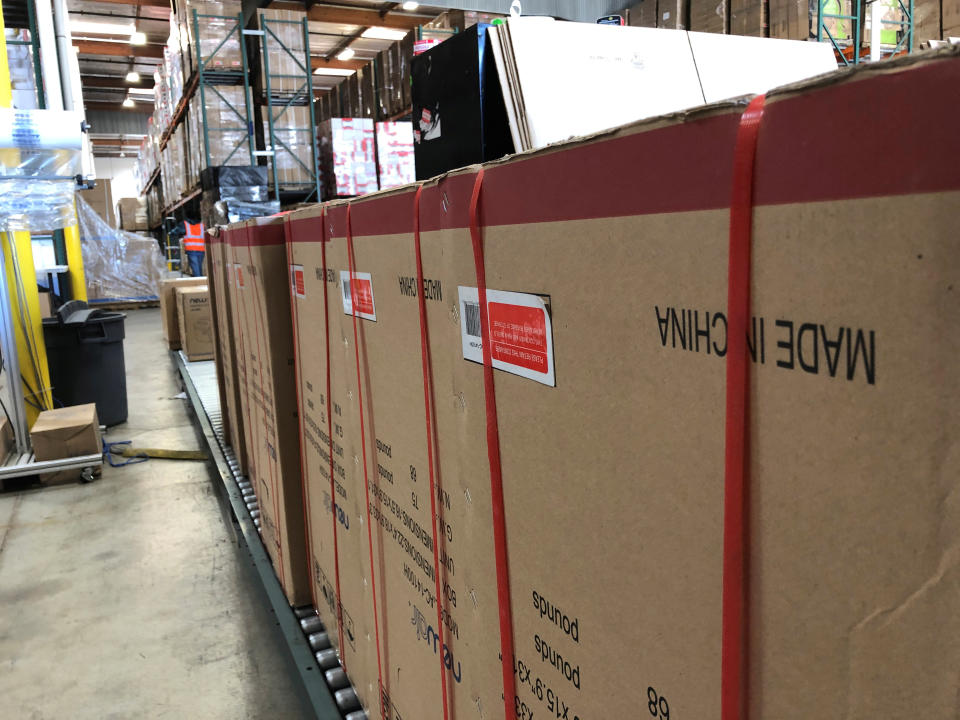Trump caves on tariffs
He can’t pull the trigger.
President Trump delayed the new tariffs on a large batch of Chinese imports that were supposed to go into effect Sept. 1, and exempted some other Chinese imports altogether. The move deescalates Trump’s trade war with China, and amounts to a tacit acknowledgement by Trump that his tariffs might hurt American consumers too much.
Laptops, cellphones, gaming consoles, and other products imported from China won’t face a 10% tariff on Sept. 1, as expected. The Trump administration says the 10% tariffs on those products will go into effect on Dec. 15, instead. But the delay reveals an unwillingness by Trump to raise the cost of products many Americans find essential, suggesting he’s bluffing about ever imposing such a tariff.
The 10% tariff will still land Sept. 1 on other consumer imports from China, including some clothing, footwear, and toys. U.S. importers can apply for tariff exemptions. Another group of Chinese imports will be exempt, supposedly for national-security reasons. Research firm Sandhill Strategy estimates that the list of imports getting a tariff reprieve totals about $155 billion worth of imports per year. That would leave about $145 billion worth of goods subject to the new 10% tariff.
If you’ve lost track, Trump has now imposed 25% tariffs on about $250 billion worth of intermediate goods imported from China, which are components most consumers never see. He announced the new 10% tariff on all remaining Chinese imports on Aug. 1, as talks on a trade deal with China broke down. Those imports are mostly finished consumer products, so shoppers would be more likely to notice higher prices reflecting the added tariff, which is a tax.
Calling Trump’s bluff
Trump has now partially reversed himself on the 10% tariff, without any corresponding concession from China. In fact, China has toughened its stance recently, essentially calling Trump’s bluff. China has refused to fulfill its pledge to start buying more U.S. farm products, for instance. And it has allowed its currency to fall in value more than usual, which makes Chinese exports to other countries cheaper and boosts domestic sales. It’s possible China has decided to bear the pain of Trump’s trade war for the next 15 months and hope Trump loses the 2020 election.
That has left Trump, who fancies himself a master dealmaker, negotiating with himself. Trump’s initial threat on consumer imports from China was to levy a 25% tariff. But when it came time to do it, he lowered that to 10%. And now it’s 10% on just half of those products, rather than all of them. And there’s an appeals process for eliminating the entire tariff.

Trump has now revealed his pain point: He’s unwilling to tax American consumers beyond a nominal level, or stomach the stock-market turmoil steep tariffs cause. This is the fundamental problem with tariffs as a tool to gain leverage in trade negotiations: To inflict pain on a trade partner, you have to hurt your own economy first, through higher taxes.
The trade war is far from over, and Trump has other forms of leverage. In addition to the Trump trade war, which is hurting the Chinese economy, China is now dealing with a governance crisis in Hong Kong, where thousands are aggressively protesting the reach of hardline communism into the former British colony. Trump still has the screws tightened on Huawei, through strict limits on its ability to interact with American firms. Trade tensions with China could flare for the rest of Trump’s presidency.
But one way out of the standoff is for Trump to lose. His hand is now weaker, though that might be good for the U.S. economy. If he called off more tariffs, it would be better still.
Rick Newman is the author of four books, including “Rebounders: How Winners Pivot from Setback to Success.” Follow him on Twitter: @rickjnewman
Confidential tip line: [email protected]. Encrypted communication available. Click here to get Rick’s stories by email.
Read more:
Elizabeth Warren is a prophet of doom
Trump’s hypocritical war on savers
Democrats are attacking the wrong companies
Everybody running for president is rich
Medicare for all won’t work. This might
Read the latest financial and business news from Yahoo Finance
Follow Yahoo Finance on Twitter, Facebook, Instagram, Flipboard, SmartNews, LinkedIn, YouTube, and reddit.

